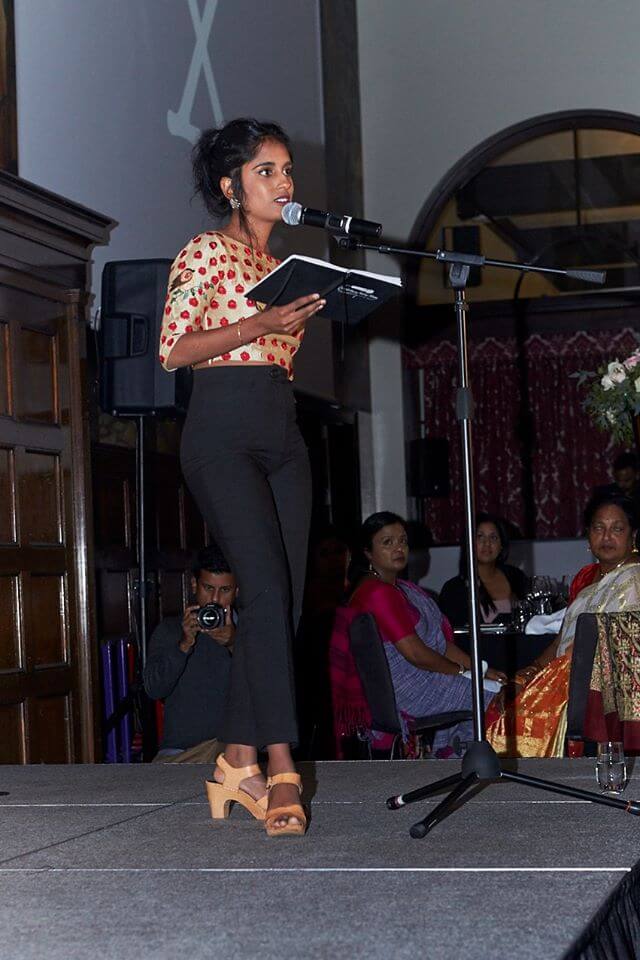Spoken word by Kirsty

The following spoken-word poem by Kirsty Anantharajah was read out at Palmera’s “Our Mothers’ Eyes” event.
One woman weary from Vishwamadu winds the corners of her sari in her fingers
in a white walled building now ashen she takes the stand, as
One hundred pair of eyes issue an old threat that lingers
her fingers run over the knots in her sari- one for each time she spoke-
and in this cloak of bumps she feels her country grow deaf.
Better it not grow silent too….
Two sandals take their first steps from the camp,
Or the farm- as it was named
like they were animals to be tamed, herded, transferred from the rights of humanity
while victors conferred.
When the gates were opened, she locked the memory of that place deep within.
They say we’re going home, but
why are we sent to the jungle when we live by the sea,
why will the army stalk our fields, when they say we are free?
Why does blood still stain the hems of our saris as we walk through the mud?
When, when will life begin to bud?
but through the questions her feet keeps a steady thud.
In a patch of cleared jungle stands an English sign
that declares the line ‘rehabilitation village.’
Three hung saris dance here in the breeze,
behind them Amma seizes her
daughters unruly black hair
and as they sit there, she wishes the cotton were walls.
Four sets of fishing boats set off to Irainativu
the village’s Ammammas leaning right over the bows,
their bodies like kites matching the rhythm of the seas
Ammamma’s boats fly past the appas who are wet only to the knees.
white hairs loose around their temples defy the easterly winds and
fly west, the island pulling them
home
After Five hundred days of sit-ins deafness worsens as the Office of the Missing Persons
‘Brave’ foreign papers called the mothers of the disappeared- don’t they
know there was nothing left to be feared?
Aunty lunch packet vernam ah? asks someone else’s son.
But the woman too was growing deaf
her ears now here for the voice that will never come
Six sticks, are planted into the red clay of Vavuniya,
three by three, six meters apart, on a field cleared of trees.
Two teams of teenagers appear
grass tickling at their ashy knees.
The captains meet in the middle, she shouldered a cricket bat,
him a rifle, Girls cant play here, he spat-
but Nisha turns and gestured at Rajini who bowls her a fast one
casually smashed for six- as the boys eyes followed it straight into sun
Seven new cows are inspected by the village,
why give them something else to pillage
asks Bahavana leaning on the palmera.
But She sees her niece growing fat on the cream
dreaming of a future over which they had control.
Squatting she picks up a stick- Vanga- we will start a patrol
Eight cracks sound as the cleaver comes down on the crab
As a child she used to hate kool
but now as the community drag their stools around her simmering chati
she is thankful for the powerful aroma, and her power,
with the squeeze of a sour lime, to freeze that moment in time
Nine weeks of drought show in the nine dry-riverbeds
spreading on Inimai’s forehead.
Hands sifting the parched earth and dead roots
as if it were pittu.
the pitter patter of little feet creeps up behind
Kutti makes a seat of the red clay
and suddenly the rains flood into Inimai’s gulley.
Not yet ten, we were waylaid this Easter.
Ravana, demon king, reminded us he will never sleep
that will keep playing with Lanka. He thinks it his domain
His age-old game is to draw lines across our island
to deal it’s people like card into piles and
watch them burn, suit by suit
My Ammama used to light candles in Kochichade
which Ravanna reduced to rubble that Sunday
And by the light of the candle she looks at Him
The people of Lanka are not game pieces
she says, as she released the lid of tin she holds
We are like this Sri Lankan spice power, this roasted thool
we are cinnamon, we are cloves, we are pepper. Try pick
us apart, destroy what holds us together
and she showed him, that rich brown mixture
ground by Lanka’s women since the dawn of time.
Ammamma blows out her candle in the rubble of Kochikade
her breath sending with it blinding spices into the demon king’s
eyes.
Ten years. A decade. How did we get here?
we sailed on ammama’s boat in the shade of Ammma’s sari
we learned courage from by truth shouted from vishuvamadu
we grew fat on the maize milk, thool and kool- made by ammas
who saved every penny and never let us know of patrols and drought
we leaned on the mothers demanding answers to questions we were to afraid to ask
we danced to the crack of cricket bats
Ten years. A decade. How did we get here?
The same way we always do, in the arms of our mothers.
